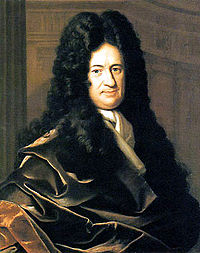Gottfried Wilhelm Leibniz
Philosopher
Gottfried Wilhelm von Leibniz (/ˈlaɪbnɪts/; German: [ˈɡɔtfʁiːt ˈvɪlhɛlm fɔn ˈlaɪbnɪts] or [ˈlaɪpnɪts]; July 1, 1646 – November 14, 1716) was a German mathematician and philosopher.He occupies a prominent place in the history of mathematics and the history of philosophy. Most scholars believe Leibniz developed calculus independently of Isaac Newton, and Leibniz's notation has been widely used ever since it was published. It was only in the 20th century that his Law of Continuity and Transcendental Law of Homogeneity found mathematical implementation (by means of non-standard analysis). He became one of the most prolific inventors in the field of mechanical calculators. While working on adding automatic multiplication and division to Pascal's calculator, he was the first to describe a pinwheel calculator in 1685 and invented the Leibniz wheel, used in the arithmometer, the first mass-produced mechanical calculator. He also refined the binary number system, which is the foundation of virtually all digital computers.In philosophy, Leibniz is most noted for his optimism, i.e., his conclusion that our Universe is, in a restricted sense, the best possible one that God could have created, an idea that was often lampooned by others such as Voltaire. Leibniz, along with René Descartes and Baruch Spinoza, was one of the three great 17th century advocates of rationalism. The work of Leibniz anticipated modern logic and analytic philosophy, but his philosophy also looks back to the scholastic tradition, in which conclusions are produced by applying reason to first principles or prior definitions rather than to empirical evidence.Leibniz made major contributions to physics and technology, and anticipated notions that surfaced much later in philosophy, probability theory, biology, medicine, geology, psychology, linguistics, and computer science. He wrote works on philosophy, politics, law, ethics, theology, history, and philology. Leibniz's contributions to this vast array of subjects were scattered in various learned journals, in tens of thousands of letters, and in unpublished manuscripts. He wrote in several languages, but primarily in Latin, French, and German. There is no complete gathering of the writings of Leibniz.
Personal facts
| Alias (AKA) | Leibnitz Gottfried Wilhelm; Leibniz Gottfried Wilhelm von; von Leibniz Gottfried Wilhelm |
|---|
| Birth date | July 01, 1646 |
|---|
| Birth place | Germany , Holy Roman Empire , Leipzig , Electorate of Saxony |
|---|
| Date of death | November 14, 1716 |
|---|
| Place of death | Germany , Hanover , Holy Roman Empire , Electorate of Brunswick-Lüneburg |
|---|
| Era | |
|---|
| Main interest | |
|---|
